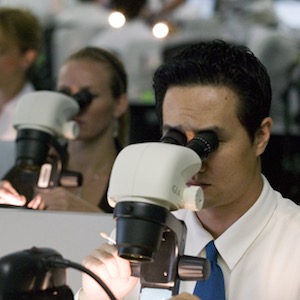
George W. Holmes (pictured), the erudite Irishman who served as JCK’s editor-in-chief for more than 22 years, died on June 20 in Downingtown, Pa. He was 93.
Holmes was born in Dublin, the youngest of three sons. His father, a captain in the British Army, was a victim of chemical warfare during World War I and died of pneumonia before Holmes was born.
Holmes and his brothers attended a special school for children of families with limited means. Its headmaster recognized Holmes’ gifts and saw that he was admitted to Trinity College in Dublin.
Committed to becoming a journalist, Holmes soon snagged a job at The Irish Times. From there, he worked at a variety of newspapers in North America and Europe, including The Manchester Guardian, the Detroit Times, Toronto’s Globe and Mail, and The Wall Street Journal.
But Holmes felt lost at those large institutions, and in 1963, he took a job at JCK, which was then based in Philadelphia, and known by its full name, Jewelers Circular-Keystone.
Five years later, he left Jewelers Circular-Keystone to found Focus, a Philadelphia business publication. In 1974, Holmes and friend Charles Bond were lured back to JCK as editor-in-chief and publisher, respectively. (Bond died in January 2021.)
Along with wife Debbie, JCK’s managing editor, Holmes packed the publication with long-form investigative articles on crime, fencing, the Swiss watch industry, and undisclosed gem treatments. During his time, JCK took home 16 Neal Awards from American Business Media (ABM). In 1985, he won ABM’s Crain Award, given to people who have made “outstanding contributions to the development of editorial excellence in business media.”
In 1992, he was part of the team that launched the show now known as JCK Las Vegas, which has since become the largest jewelry trade show in the United States and one of the largest in the world.
In his farewell editorial before retiring in 1996, Holmes wrote: “Since becoming editor-in-chief of JCK in September 1974, I’ve written 264 editorial columns. Some annoyed you. A few startled you. I’m sure quite a few bored you. Hopefully, some made you think about some issues with more focus or greater intensity.”
In one telling detail, he said that he’d read so many handwritten responses to JCK’s Reader Panel, he could pick out frequent responders just by their penmanship.
“I leave with very heartfelt thanks to the many, many people who have helped make my job so fulfilling,” he wrote, “even to those who from time to time made it hell.”
George and Debbie briefly returned to JCK full-time for several months beginning in October 1997, following a staff walkout to start a rival publication. In 2004, the American Gem Society honored Holmes with a Triple Zero Award.
Post-retirement, Holmes devoted himself to hiking, gardening, volunteer work, and periodically contributing to local newsletter The Milemarker.
Those who worked for Holmes remembered his high standards and the way he nurtured and supported talent.
Peggy Jo Donahue, who was Holmes’ immediate successor as editor-in-chief, called him “ethical, fair, patient with rookies, and a tremendous teacher.”
“Not a day has gone by when I haven’t thought at some point, ‘What would George do?’ ” she said, “especially when matters of professional ethics arise.”
Hedda Schupak, who later became editor-in-chief, called Holmes a “wonderful mentor.”
“JCK was an unusual workplace because of George. Many members of its editorial staff formed lasting, tight friendships, and many of the industry’s most storied and respected journalists got their start on George’s staff. When he was once asked how he achieved this rather magical combination, he replied, ‘I always try to hire intelligent oddballs.’ ”
She remembered the time the magazine published an article on diamond treatments that so irked an advertiser, it pulled a spread that was scheduled to run for 12 months.
“The vice president slammed into my office, and a vigorous shouting match ensued,” she recalled. “I called George after the incident. After questioning me thoroughly to ensure that we had done everything by the book in the article—we had—he said, ‘If you don’t piss someone off occasionally, you’re not doing your job. Don’t worry about it. Advertisers want to be in JCK precisely because of that level of reader trust. They’ll get over it and they’ll be back.’
“He was 100% right. The spread was back the following month.”
Holmes “allowed me and others to flourish by letting them manage their own assignments and dig for their own stories—something I relished,” remembered Russell Shor, who also worked for Holmes. “He was about quality, not control. And everyone who worked for him can be thankful for that.”
Former JCK editor Robert Weldon says: “With George, I found, there was no end to learning and growing. He was a classic journalist in the sense that [he thought] writers should always remain in the background and not be part of the story. He was a stickler about facts over feelings. He was perpetually curious, thoughtful, and prodding.”
Weldon recalled that Holmes would constantly remind his reporters: “Remember that you are not part of the trade, because you are reporting on it.”
Joe Thompson, who worked for JCK for five years before becoming editor of Modern Jeweler and a string of watch publications, called Holmes a “superb editor-in-chief.”
“He was extremely smart, very experienced, with a wry sense of humor. He had a quiet charisma. He could be inspiring, demanding, encouraging, and intimidating all at the same time.
“He was inspirational because he had a very strong sense of mission, which he conveyed to the team. He felt business journalism was an honorable profession, that the information we offered the industry ultimately helped our readers do their jobs better.
“Which meant we had to be at the top of our game. Always. George had very high standards. He wanted JCK to be as good as any magazine that our audience of professionals read. At every staff meeting, each editor had to present three ideas for stories that were important to our readers, and be prepared to elaborate on them.”
Thompson stayed close with Holmes over the years and was supposed to visit him the weekend before he passed away.
“As I said on the podcast, I loved the guy. I owe him so much, and I will miss him terribly.”
George Holmes is survived by Deborah (Debbie), his wife of 51 years. A memorial gathering is planned.
Those wishing to honor George Holmes’ memory can make donations to Brandywine Valley SPCA, Habitat for Humanity of Chester County, and Chester County Food Bank.
Photo courtesy of Peggy Jo Donahue
- Subscribe to the JCK News Daily
- Subscribe to the JCK Special Report
- Follow JCK on Instagram: @jckmagazine
- Follow JCK on X: @jckmagazine
- Follow JCK on Facebook: @jckmagazine






